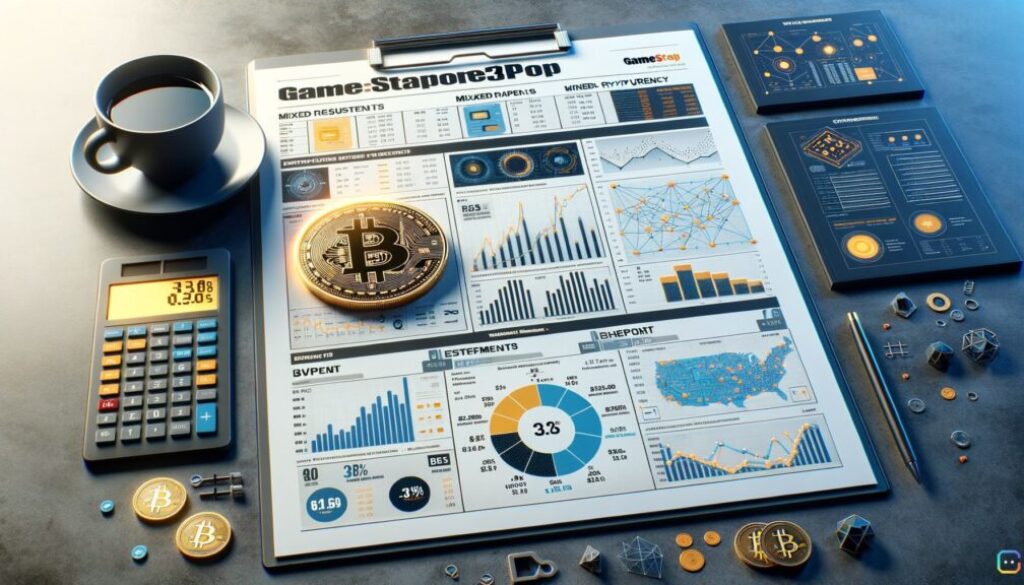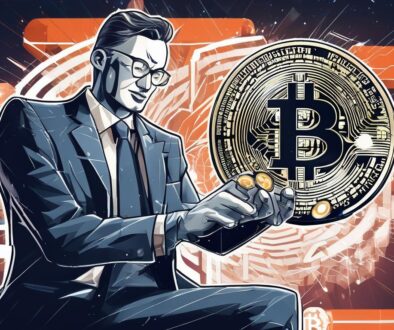GameStop Reports Mixed Results and Bitcoin Investment

GameStop Reports Mixed Q1 Results While Making a Bold Bitcoin Investment
GameStop Corp (GME) found itself in the spotlight once again following the release of its first-quarter financial results. While the company showcased operational improvements, a decline in revenue led to an immediate dip in its stock price. However, the biggest headline-grabber was GameStop’s strategic foray into the world of cryptocurrency, marking its first significant investment in Bitcoin as a reserve asset.
GameStop’s Q1 2025 Financial Performance: A Mixed Bag
The first quarter of 2025 presented a nuanced picture for GameStop. The company reported net sales of $732.4 million, a notable 17% decrease compared to the $881.8 million recorded in the same period last year. This decline largely reflects the ongoing industry trend of consumers shifting towards digital game downloads and away from physical retail purchases.
Despite the revenue dip, GameStop demonstrated impressive strides in its profitability. The company successfully transitioned from a net loss of $32.3 million in Q1 2024 to a positive net income of $44.8 million in Q1 2025. This significant turnaround is primarily attributed to disciplined cost management strategies and various operational efficiencies implemented by the company. Furthermore, operating losses also saw a reduction, decreasing to $10.8 million.
However, the market’s initial reaction was swift and negative. Following the earnings announcement, GameStop’s stock price experienced a decline of over 3.5% in after-hours trading, settling at around $29, as investors reacted to the top-line revenue miss.
GameStop’s Bold Bitcoin Bet: A Strategic Shift?
Perhaps the most unexpected and significant development from GameStop’s Q1 report was its substantial investment in Bitcoin. The company announced the acquisition of 4,710 BTC, valued at approximately $513 million. This landmark move positions GameStop alongside a growing list of public companies that are embracing Bitcoin as a long-term financial tool and treasury reserve asset.
The decision to invest in Bitcoin signifies a broader strategic pivot for GameStop, indicating a willingness to diversify its asset base beyond traditional holdings and venture into the evolving digital asset landscape. Interestingly, GameStop funded this significant Bitcoin purchase through debt financing, a method that allows the company to leverage its balance sheet for growth and strategic investments.
Key aspects of GameStop’s Bitcoin investment:
- Amount Acquired: 4,710 BTC
- Approximate Value: $513 million
- Funding Method: Debt financing
- Strategic Rationale: Diversifying assets, treating Bitcoin as a treasury reserve.
- Alignment: Joins other public companies like MicroStrategy and Tesla in holding Bitcoin.
This bold move, while potentially lucrative, also introduces a new layer of risk for GameStop. The value of Bitcoin is known for its significant volatility, meaning the success of this strategy heavily relies on the long-term appreciation of the cryptocurrency. GameStop’s commitment to holding Bitcoin as a reserve asset, despite short-term price fluctuations, signals a strong belief in its future value and role in the global financial system.
What This Means for GameStop’s Future
GameStop is navigating a complex transition, balancing efforts to improve operational efficiency and profitability in a challenging retail environment with ambitious, forward-looking strategic investments. The Q1 results demonstrate progress on the operational front, even with declining sales. The Bitcoin investment, however, represents a more speculative, yet potentially transformative, gamble on the future of digital assets.
As GameStop continues its evolution, all eyes will be on how its Bitcoin holdings perform and how this digital asset strategy integrates with its core business. This dual approach of cost management and innovative asset diversification could define GameStop’s trajectory in the coming years, making it a company to watch not just in retail, but also in the broader financial and cryptocurrency markets.


